Why can't the US give up on Qatar?
(Baonghean.vn)- The mixed messages from the US about the Qatar crisis have shown the complex nature of the accusations against this oil-rich Arab country.
Journalists at Middle Eastern media organizations have been “severely ostracizing each other” since Saudi Arabia, the United Arab Emirates (UAE), Egypt and Bahrain severed diplomatic ties with Qatar last month over Doha’s alleged support for terrorist groups IS, Al Qaeda and Iran-backed militants in several Gulf countries.
 |
| Qatar's Emir Al-Thani meets with US President Donald Trump in Riyadh, Saudi Arabia on May 21. Photo: AP |
Based on the US diplomatic establishment and the Pentagon's words and actions since the Qatar crisis erupted, it is clear that Washington plans to continue to coordinate closely with all Gulf Cooperation Council (GCC) member states to fight terrorism.
However, the US administration's mixed messages on the Qatar crisis show the multifaceted and complex nature of the common accusations against the oil-rich Arab nation.
Senior officials in both Congress have criticized both Doha and Riyadh, seeing both as part of the problem. During President Obama’s tenure, Qatar’s ties to Hamas and other Sunni Islamist groups drew strong criticism from US lawmakers.
John Kerry, when he was a senator in 2009, said that “Qatar cannot continue to be an ally of the United States and then transfer money to Hamas.”
Last month, President Donald Trump accused senior officials in Doha of supporting terrorism. Earlier this month, responding to the 13-point demands that the Gulf countries called on Doha to implement, US Secretary of State Rex Tillerson’s communications adviser, RC Hammond, admitted that “this is a two-way street” and “there are no clean hands.”
Last year, US lawmakers overrode President Obama’s veto and passed the Justice Against Sponsors of Terrorism Act (JASTA), which implicated the Saudi government in the September 11, 2001, terrorist attacks. As a presidential candidate, Mr. Trump supported the act, as did Hillary Clinton, although JASTA’s future remains uncertain.
In Secretary Tillerson’s shuttle diplomacy in the GCC, he called Doha’s response to the demands of the four Gulf states “very reasonable,” a move that clearly shows that Washington’s diplomatic establishment continues to value Qatar as a close ally of the United States. Moreover, the United States and Qatar signed an anti-terrorism agreement while Tillerson was in Doha on July 11.
 |
| US Secretary of State Rex Tillerson meets his Qatari counterpart in Washington. Photo: AP |
The two countries previously completed a $12 billion fighter jet deal in June. Clearly, despite President Trump’s tweets last month, Washington and Doha have maintained strong ties, with the US opposing the Gulf countries’ blockade of Doha.
So does this agreement shift the focus away from Riyadh and other GCC states? Perhaps. Qatar can now claim to be complying with Washington’s standards for combating terrorism.
Even countries led by Saudi Arabia or the UAE will be pressured to sign similar agreements or explain the reasons behind their refusal to do so. In any case, Washington and Doha signing an anti-terrorism agreement would undermine the Gulf Four’s efforts to persuade the US to see Qatar through its “lens.”
For all the challenges facing the White House, the Trump administration has pledged to increase counterterrorism cooperation with both Saudi Arabia and Qatar, and the US intends to force Riyadh and Doha to negotiate with each other.
Mr Tillerson's aim is to strengthen the position of the US and its Sunni Arab allies in the fight against IS and other militant groups, as well as a rising Iran.
If diplomatic efforts to broker a resolution to the Qatar crisis prove futile, the Trump administration will face a more challenging climate in the Middle East that will limit the White House’s ability to achieve its regional goals.
Lan Ha
(According to National Interest)
| RELATED NEWS |
|---|





.jpg)


